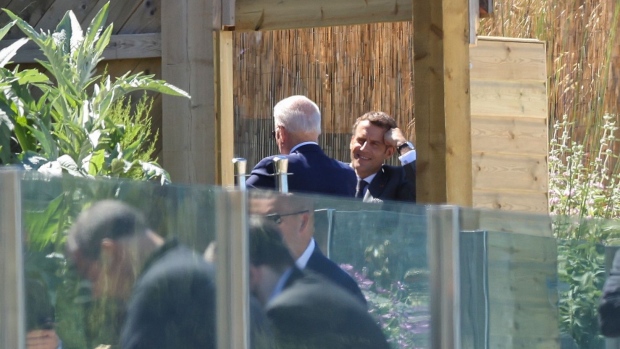Jun 13, 2021
Leaders Zero in on Climate Change in Summit Talks: G-7 Update
, Bloomberg News

(Bloomberg) -- It’s the last day of the Group of Seven summit hosted on the southern English coast by U.K. Prime Minister Boris Johnson, with the sessions to focus on the collective challenge of climate change. There’s been haggling over some of the climate goals for the final communique, including on how quickly to phase out diesel and petrol cars.
Still hanging over the summit is the question of how hard to push as a group against China’s expanding influence. It’s also unclear how the G-7 will tote up a promise to provide 1 billion extra doses of Covid-19 vaccines for other countries.
Once the meeting wraps up, U.S. President Joe Biden heads for London to meet the Queen, and then onto Brussels for Monday’s NATO summit.
Read: The Green Revolution Is Being Built on a Very Dirty Industry
Key Developments:
- China pushes back against G-7 narrative on its actions
- Unclear if communique for meeting has been finalized
- G-7 to be followed by NATO and E.U.-U.S. summits next week
China says ‘handful of countries’ shouldn’t decide global order (7:58 a.m.)
Even before a final communique is issued, Beijing has taken a swipe at the G-7 discussions, saying a plan by Western countries to safeguard the so-called “rules-based international system” is outdated.
“The days when global decisions were dictated by a small group of countries are long gone,” a spokesperson for the Chinese embassy in the U.K said in a statement on the embassy website. “We always believe that countries, big or small, strong or weak, poor or rich, are equals, and that world affairs should be handled through consultation by all countries.”
An earlier draft of the communique seen by Bloomberg urges China to respect human rights, while calling it an “international partner, economic competitor and strategic rival.” -- Shamim Adam
Doubts over the detail in climate financing pledges (7:37 a.m.)
G-7 leaders face calls to spell out how much money they will commit to help developing countries move away from fossil fuels and tackle climate change. But while they are set to confirm a pledge to mobilize $100 billion a year to that effect, they have yet to spell out how much more each of them will put toward this goal (one diplomat says the amounts being discussed fall far short of what’s needed), and campaigners want to see details before the summit ends.
Overnight, the U.K. confirmed G-7 leaders will back a green rival to China’s Belt and Road infrastructure initiative. The program, first reported by Bloomberg earlier this month, will aim to support green transitions and infrastructure projects in developing countries around the world.
As previously reported, leaders will also set out action to slash carbon emissions, including ending all unabated coal as soon as possible, ending almost all direct government support for the fossil fuel energy sector overseas and phasing out petrol and diesel cars, the U.K. government said in a press release. -- Alberto Nardelli, Tim Ross
G-7 Eyes Ambitious Shift to Electric Cars and Away From Oil
European nations want clearer remit for proposed China task force (earlier)
Further haggling emerged over how to tackle the China question within the G-7, especially a proposal to set up a task force. A European official disputed a U.S. characterization of the discussion that suggested German Chancellor Angela Merkel and Italian premier Mario Draghi were taking a softer line on Beijing than others.
The official said all G-7 members support a tougher stance on China with a strategy of working with it on climate change, competing with it on trade and criticizing it over human rights. But both Merkel and Draghi want any task force to have a clearly-defined remit.
Merkel separately told reporters she didn’t want to frame a task force as an anti-China effort and that it needed a positive agenda focused on climate and trade: “This is not about being against something, but for something.” The European official cited some irritation at the U.S., saying it was seen to be framing announcements in ways that didn’t always reflect the conversation in the room. -- Alberto Nardelli, Arne Delfs
Canada feels caught in the middle between the U.S. and China (earlier)
Biden spoke with Canadian Prime Minister Justin Trudeau about China on the sidelines of the meeting, according to a Canadian official who spoke on condition of anonymity. Canada has been put in a difficult situation by the tougher U.S. approach to China, feeling squeezed between the two superpowers, the official said.
Trudeau and Biden discussed the two Canadians currently jailed in China on national security charges. They were detained after Canadian authorities arrested Huawei Technologies Co. Chief Financial Officer Meng Wanzhou on a U.S. extradition request. -- Kait Bolongaro
©2021 Bloomberg L.P.


